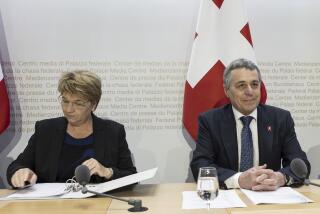Baker Challenge: Keep Talks Going : Mideast: But the structure of the conference will accentuate old hatreds and distrust rather than promoting a dialogue.
- Share via
MADRID — Now comes the hard part.
For the last eight months, Secretary of State James A. Baker III has devoted many of his waking hours to a campaign to bring Israel and its Arab antagonists to a peace conference. That meeting now is set for Oct. 30 in the Spanish capital.
But the key players--Israel, Syria, the Palestinians and Lebanon--are going to the talks with very little enthusiasm. It is as if they have told Baker that they will go to the party but they won’t enjoy themselves.
For Baker--and to a lesser extent for his junior partner, Soviet Foreign Minister Boris D. Pankin--the challenge now is to keep the parties talking until they settle differences which, at an emotional level, go back hundreds of years.
So far, Washington has been vague on the details of what it wants the conference to accomplish. One official says that just bringing Israeli and Arab delegates into the same room will produce a perception-altering experience. Ultimately, he reasons, Israelis and Arabs will find that they can do business with each other just as Americans and Soviets eventually did.
But there is no guarantee that it will work that way. The level of hostility in the Middle East is far more ingrained than the U.S.-Soviet rivalry ever was.
The formal structure of the conference will accentuate the hatreds and distrust rather than promote a dialogue that could lead to understanding. According to U.S. planners, the formal conference will last for three days and consist entirely of set-piece political speeches. If the past is any guide, the rhetoric will be designed to inflame existing controversies. No one expects anything conciliatory to be said.
Arabs and Israelis have a shared history but no agreed frame of reference. For instance, what Israelis call the “war of independence,” Arabs call “the catastrophe.”
Syrian Foreign Minister Farouk Shareh has already said that he will refuse to shake hands with Israeli Foreign Minister David Levy when they meet at the conference’s opening. Other insults--some intended and some accidental--can also be expected.
So the delegates are likely to be in a foul mood when they turn to the heart of the process--unstructured one-on-one negotiations between Israel and each of its primary Arab adversaries, Syria, the Palestinians, Jordan and Lebanon.
A senior Administration official tacitly concedes that the process may not even get to the bilateral stage, set to start four days after the beginning of the conference.
“We are going to do what we can to serve as a catalyst and try to move the process forward assuming . . . that we get to bilaterals, because this is the Middle East,” the official said.
He said U.S. officials, joined sometimes by Soviet representatives, “will serve as the driving force for the process.”
If invited by both sides, the official said, American or Soviet mediators will sit in on the talks.
The organizers expect that the talks will break down from time to time. Washington’s job then will be to get them restarted.
All sides are going to the talks with deep misgivings.
An Israeli cartoonist recently summed it up: A bemused Israeli Prime Minister Yitzhak Shamir is shown at the desk of a hotel labeled “Peace Conference.” The clerk asks: “Do you have reservations?” Shamir replies, “Many of them, but I’ll check in anyway.”
Syria is no more eager to attend. It has already said it will boycott the proposed final phase of the conference in which all of the countries of the region are expected to get together to talk about cooperative projects such as water resources and economic development and such shared dangers as the Middle East arms race.
The Palestinians probably have the most to gain from the talks. But they also are apprehensive--afraid that they are about to trade their dreams of a Palestinian state for the reality of something far less.
Although President Bush and Soviet President Mikhail S. Gorbachev will be present to kick off the conference, all of the participants have agreed to send their foreign ministers to head the delegations.
As a result, Israel and Syria will be represented by Levy and Shareh rather than Shamir and President Hafez Assad. Although Levy and Shareh are staunch nationalists, they are far less prickly in style than their bosses.
More to Read
Get the L.A. Times Politics newsletter
Deeply reported insights into legislation, politics and policy from Sacramento, Washington and beyond. In your inbox twice per week.
You may occasionally receive promotional content from the Los Angeles Times.







